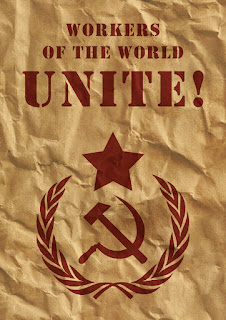So far as has been revealed, there were no Axis spies in Los Alamos during the Manhattan Project. However, there were several Soviet spies.
The most damaging (and possibly most famous) was Klaus Fuchs. Two threads run through Fuchs’ life, mathematical brilliance and committed communism. To me, one of the most interesting things about his early life is to see how the huge events of the 1930s affected this single man. That is what this blog post will cover. Next month, I will talk about his activities in the Manhattan Project.
It should have been obvious that Fuchs was a security risk. He was a committed communist from his early years. His father, Emil Fuchs, was a socialist pastor, and several of his children followed in his footsteps.
Fuchs' brilliance was also obvious early on. At sixteen, he was recognized as the top student in his city, but his award was given in private due to his problematic politics.
 |
| University of Potsdam author bbsferrari, Deposit Photos |
In Germany at this time, the Nazi party was rising in power and saw the communists as the only other organized political party. This led to many clashes between the students in the two groups. By October of 1930, Gerhard had left Leipzig due to health concerns, and Klaus became the leader of the communist student group. In one clash with the Nazis, he was beaten and tossed into a fjord to drown. He survived, and continued in his leadership position.
In 1933, in a political move that would shake the world, Hindenburg appointed Hitler Chancellor of Germany. It shook Fuchs' world as well. Soon after Hitler's appointment, the Reichstag building burned and the communists were blamed. Communist activity was forced underground.
Fuchs worked underground in Berlin for a while, but was eventually targeted and forced to leave Germany. His first stop was an international meeting of communist youth in Paris. Again, his allegiance was clear.
Back in Germany, his father was imprisoned for speaking against the state. Later, his sister would give birth while in prison, and his brother would be imprisoned as well.
Klaus escaped to England, sponsored by a friend of the family, Ronald Gunn. At 21, he was one of 3100 German refugees in 1933.
Back in Germany, his father was imprisoned for speaking against the state. Later, his sister would give birth while in prison, and his brother would be imprisoned as well.
Klaus escaped to England, sponsored by a friend of the family, Ronald Gunn. At 21, he was one of 3100 German refugees in 1933.
Gunn also arranged for him to meet Nevill Mott, the director of the physics department in Bristol, a future Nobel Prize winner, and a man fluent in German. Mott arranged for Fuchs to earn his degree by research, since he was unable to understand lectures in English.
Within three years, Fuchs completed his undergraduate degree and all the work for his PhD. He had also published two landmark papers. His brilliance in mathematics and physics are undisputed.
But the other constant thread through his life, his belief in communism continued in this time period as well. In October 1934, his German passport expired, and he became stateless. To avoid deportation to Germany, he had to register with the local police station. During this process, the German police informed the Bristol police that Fuchs was a “notorious communist.” This information from 1934 is the first note in Fuchs’ MI5 file mentioning his connection to communism, and it was known well before he joined the war effort. MI5 and Bristol police believed that Fuchs was not active in the communist cause during his time in Bristol. They were wrong.
 |
| author frankie_s, Deposit Photos |
But the other constant thread through his life, his belief in communism continued in this time period as well. In October 1934, his German passport expired, and he became stateless. To avoid deportation to Germany, he had to register with the local police station. During this process, the German police informed the Bristol police that Fuchs was a “notorious communist.” This information from 1934 is the first note in Fuchs’ MI5 file mentioning his connection to communism, and it was known well before he joined the war effort. MI5 and Bristol police believed that Fuchs was not active in the communist cause during his time in Bristol. They were wrong.
In 1937, Fuchs was sent to Edinburgh, partly because of a lack of funding in Bristol, but also because of his problematic politics. In Edinburgh, he worked with Max Born, another German refugee and future Nobel Prize winner. Born had another German refugee as a student, Walter Kellerman, the son of a rabbi.
 |
| author MishaAbesadze, Deposit Photos |
Then, in 1939, Britain went to war with Germany. Klaus was immediately labeled an enemy alien, and eventually sent to an internment camp in Canada, along with other German refugees and POWs. Conditions there were originally horrible, but did improve with time. Factions developed among the prisoners. Klaus, of course, was part of the communist faction. Here he met Hans Kahle, a man who probably had a behind the scenes hand in introducing Klaus to his Soviet handler.
I found two side notes of particular interest about these camps. One of the internees was a great-great-grandson of Queen Victoria, the Count von Lingen. Fearing negative publicity, the British government did not give him special treatment. He used his connections to better the conditions in the camps. The second point of note was that there was a lot of confusion about the distinction between German refugee and German POW. Many German-Jewish refugees feared being labeled as POWs and being returned to Germany under a prisoner exchange!
 |
| Manzanar Watch Tower Author fotogal, Deposit Photos |
In December of 1940, Fuchs returned to Edinburgh, soon to join the British war effort. One story that continues to circulate in Los Alamos is that Fuchs joined the atomic program because the British didn't trust him enough to assign him to work on the more critical radar program. Next month, I will include some of the notations on his MI5 file that should have been shared with the United States, and weren't. Stay tuned.


Thank you for this interesting post this morning.
ReplyDeleteVery interesting!
ReplyDelete